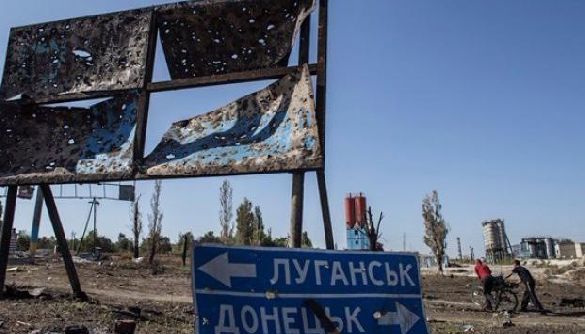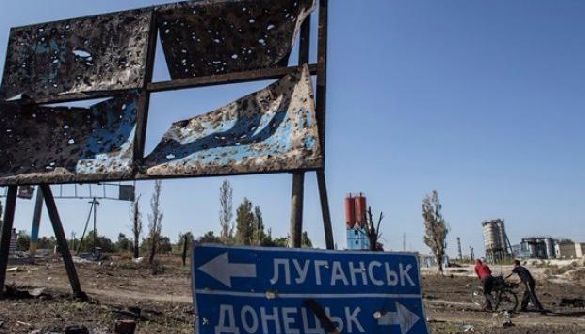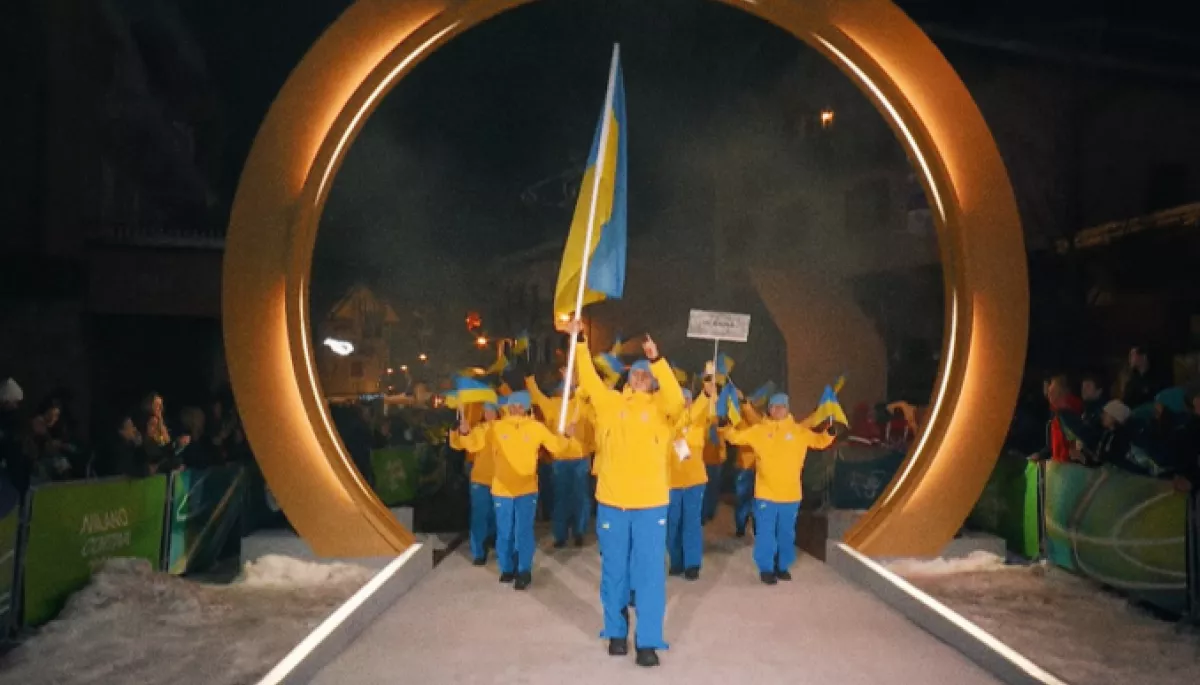
Donbas: Hard Facts Lagging Behind Post-Truth
Donbas: Hard Facts Lagging Behind Post-Truth


During September-October, monitoring of the government communication policy toward Donbas has detected such trends:
- President intensified communication about his conflict resolution diplomacy but avoided uncomfortable questions about motives and consequences of changing top officials in the region;
- Cabinet of Ministers and profile ministries stopped talking about Donbas;
- New head of Donetsk State Civil Military Administration repeated mistakes of his predecessors but tried to be frank with the people;
- Parliamentary political parties sought to win votes and hurt opponents, using Donbas issues, but avoided to speak with the people about policy alternatives for Donbas.
President fell back on catch-all messages
Since March-April President began to visit Donbas almost every month. Every time he used these opportunities differently. In the first half of the year Petro Poroshenko paid a lot of attention to the social and economic issues. Then, since August he switched to communicating messages about political and security situation in the region.
In September-October president spoke about strengthening army (11 news), sending UN peacekeepers to Donbas (6 news), defending Ukraine from Russian aggression and sustaining anti-Russian international sanctions (5 news each).
Only on one occasion, on October 12 (if not considering formal brief information about signing law which provided housing to IDPs) president addressed directly people in Donbas when he visited Mariupol and Shykokyne.
In his speech before young conscripts and their parents president reperated his commitment “to liberate Donbas only by political and diplomatic means». He underlined his delight that “this position toward conflict resolution is supported by 60% of population”.
Another Poroshenko’s message was far from that clear: “We must protect Mariupol, Kramatorsk, Lysychansk and Severodonetsk. We must protect ourselves not only from military aggression, but also from hybrid threat”. What president meant, speaking about “hybrid threat”, how he saw government response and what ordinary people must do to confront it, all of these remained unknown.
Other puzzles surfaced when government and president made decisions about removing head of Luhansk oblast state administration. In March-April monitoring we predicted that Yuriy Harbuz, head of Luhansk oblast civil military administration would be dismissed. On October 24th minister for family, youth and sport affairs announced that the Cabinet of ministers made decision to confirm president’s decision to fire Harbuz.
It was a surprise for external observers because just on October 17th press service of presidential administration informed about Ms. Poroshenko visited Luhansk oblast to participate together with Harbuz in inauguration of her national pet project facility, Resource Center for Inclusive Education in town of Rubizhne. Ms. Poroshenko and Luhansk governor signed a letter of understanding between Poroshenko Charity Foundation and Luhansk oblast about starting joint project in the region. As a result it looked like something went wrong during president’s wife visit to Luhansk or that this ceremony was the last song of the governor who knew about his dismissal.
Anyway, there were no explanations from president or prime minister, two key figures, who according to the Constitution, have power to make such decisions, why it had happened. Consequently, the information vacuum was filled with rumors and assumptions that did not strengthen public trust in Luhansk region toward central government.
For instance, a pro-Russian media outlet “Vesti”, citing anonymous source from administration of president, insisted that Harbuz was fired because he refused to use his power to influence election process in favor of Poroshenko. However, our monitoring showed that Luhansk governor was very loyal president’s executive who did not question president’s orders or authority.
Now it would be very hard for the president to reject such allegations and restore people’s trust in his next representative in the region affected by war and recession. It also complicated president’s task to persuade local population in necessity to support government in its action to mitigate security threats. Thus in the next monitoring we shall see how Poroshenko is going to do Sisyphean labor.
Cabinet of Ministers: communication with Donbas forsaken because of elections?
In September-October Cabinet of Ministers and ministries in charge of Donbas issues reduced their communication about and toward Donbas to the lowest level since the beginning of the year.
Minister of Interior Arsen Avakov stopped promoting his peace plan. In September he authored an article in “Weekly Mirror” about ecological threats emanating from occupied territories.
At the same time Avakov’s nominal party boss, ex-prime minister Arseniy Yatseniuk began a personal promotional campaign in which he duplicated Poroshenko’s electoral messages. Therefore, it will be interesting to see whether Avakov’s peace plan was just a preparation or a trying ball for Yatseniuk’s own “conflict resolution strategy” or Avakov will continue his own independent political campaign to win favors of other favorites of the presidential elections. We will follow minister’s communication in the nearest future.
Meanwhile first deputy minister of information policy Emine Dzhaparova announced that the ministry was working on the Action Plan of implementation of the Strategy of information reintegration of Donbas. In her opinion Action Plan would be approved by government in the beginning of the next year. However, we have reasonable doubts that the cabinet of ministers, preoccupied with election campaign, will pay attention to another formal document.
Minister of temporary occupied territories and IDPs affairs Vadym Chernysh continued to speak about almost everything except his duties and work. He estimated Russian expenditures on occupation and Minsk agreements, participated in inauguration of the objects built by international donors or local authorities, reported about his trips abroad.
He addressed people, living in the occupied territories, only on one occasion when promised to “begin actions” in order to protect people whom separatists threatened to take away houses for making too many trips across line of contact. Chernysh appealed to international law top condemn such practice but did not said what his ministry would do to help those people.
Thus we have to repeat our main concern about MinTOT and its communication with people in Donbas. It continues to disregard interests of its target groups but the absence of attention to such irrelevant use of power and resources did not attract attention of president and/or prime minister. In that case it looks like MinTOT is not considered as a real or important state agency, which must operate and communicate efficiently.
Donetsk State Civil Military Administration: Kuts makes mistakes but hope remains
We should start from admitting the fact that we missed an important element in public communications of new Donetsk governor Oleksandr Kuts. Being as tech savvy as president, Mr. Kuts registered in his new Twitter account on August 1st (@oleksandrkuts1) and started to use it to disseminate the most important news about his activity.
It is hardly coincidence that Kuts mentioned Poroshenko in his first tweet:
Renovating checkpoints in Donetsk oblast. The tents, service zones, water and electricity supply networks has been installed in checkpoint Mariinka. People should be given comfortable conditions – this is President’s order to Donetsk state administration.
Here is what we found out after we looked through and analyzed twitter-activity of Oleksandr Kuts in August, September and October.
In total there were 78 tweets, which we divided in several categories:
- 25 tweets about formal ceremonial events (including inauguration of reconstructed or repaired objects of social infrastructure);
- 23 tweets about social policy, commenting progress of reconstructing or repairing schools – 13, hospitals – 4, caring of orphans – 3, redistributing budget money – 2, housing – 1;
- 21 tweets about economy, among them about construction of road and communal utilities infrastructure з– 18, SMEs support – 3 (2 about Zhebrivskyi pet project «Ukrainian kurkul”), coal mining industry – 1;
- 9 tweets about working meetings;
- 7 tweets addressed toward people living in the occupied territories, including information about work of checkpoints;
- 5 tweets about meetings with representatives of the embassies and international organizations;
- 2 tweets on church affairs: about meeting with representatives of different religious communities (October 17) and congratulations with «Day of revival of Ukrainian Orthodox Church» (October 11).
- 1 tweet about IDPs: 40 IDPs became owners of new apartments in Kramatorsk (and same post in Facebook about former dormitories redesigned as living blocs due to EU financing).
We also can say that Twitter is more popular tool of Mr.Kuts than Facebook, where we find only 50 relevant posts during the same period of time.
In his tweets Oleksandr Kuts mentioned only one person except himself – president Petro Poroshenko in nine tweets. However, most of them were released when president visited Donetsk oblast.
Another interesting fact is that Donetsk governor mentioned nothing about visits of different ministers, for instance, participation of minister for family, youth and sport affairs Ihor Zhdanov in opening of the Youth center in Svitlodarsk. It makes him to look differently from his predecessor, who never missed such opportunity to demonstrate his paternal care about Donbas people…
However, in general Kuts continued to repeat patterns of Zhebrivskyi communication. What he is doing differently is posting more videos instead of photos to prove his words about progress in reconstruction of the region.
Kuts did not bother himself by explaining why certain decisions are made and how they make difference for the local communities. For instance, Kuts informed about transformation of the former railway hospital in Bakhmut in the regional health and training center for sportmen and sportwomen. Although this renovated object should substitute the loss of such center after occupation of Dontesk, it is not evident whether interests of the local people, patients of former hospital, were regarded when decision was made.
Also, we have to make several other critical remarks about public relations and communications of new Donetsk head and his mistakes when he tried to inform wider audience about his “100 days” in office.
- It is not enough to post in Facebook or Tweeter two hours of video of the press conference if you want to attract attention of the people. There should be short clips with main messages which people should remember.
- It is not productive to use bureaucratic language during such events but to speak to people using everyday talk. Sometimes, as it appeared, Kuts can do it.
- It is not a good idea to speak on the topic you hardly understand. Better delegate it to experts (even during public ceremonial meetings).
Well, next time we shall see whether Oleksandr Kuts understands his strong and weak points and can learn how to communicate with the people living in Donbas effectively.
Luhansk State Civil Military Administration: when amateur football contest reveals secrets
As we have mentioned above, the decision to fire Yuriy Harbuz was predictable but happened quite unexpectedly. On October 17th he сescorted Ms. Poroshenko during her visit to town of Rubizhne and the next day he visited Luhansk regional specialized children hospital in Lysychansk.
Spectacularly, during this visit the chief doctor praised Harbuz and her words were cited by official web page of Luhansk CMA: «We are very happy that we have got this governor. Yuriy Harbuz is the first executive who reacted to the needs of pediatrician healthcare in oblast. It took only two months for him to facilitate opening of the new reanimation department for infants».
In fact, such appraisal from subordinate executives toward chief executives is not common if everybody knows that a person in senior position is on the brink of dismissal. Thus it is highly possible that removal of Harbuz surprised a lot of people in the region.
However, on October 21st official web page informed that first deputy head of Luhansk CMA Serhiy Fil awarded winners of the regional amateur football contest and told media that regional authorities paid a lot of attention to development of sport infrastructure, a message that can be communicated only by the highest local official. However, on the next day Mr. Fil chaired meeting with US Ambassador as acting head of Luhansk CMA.
The sudden change of the governor happened without any kind of official explanation. In our opinion, such disregard toward local public is not the best way to win their support and trust. In a nutshell the communication with the people in Luhansk oblast looks rather amateur than professional.
First deputy chairwoman of the parliament reveals uncomfortable facts about life in Donbas
Ms. Iryna Herashchenko is a true champion of building efficient and permanent communication about Donbas. Earlier this year, as we admitted, Herashchenko became less active in communicating with the local people but she continued to share her concerns about situation in Donbas with wider public.
For instance, in September and October her communication was more substantive than of profile ministries. She not only spoke about problems but also tried to advocate necessary policy steps.
Thanks to Ms. Herashchenko we know several specific facts about Donbas:
- She provided information about slow process of supplying fighting troops in Donbas (her post about visit to Avdiivka
- She mentioned that de-mining in Donbas struggles to get vitally required equipment which endangers lives of servicemen(post about Svitlodarsk bow):
- She spoke about differences in attitudes toward war between Ukrainians living in Donbas and people from other regions of the country (comment on the article in “Novoye Vremya” magazine)
- About negligence of the law enforcement agencies which failed to register all crimes committed in the occupied territories (post about questions hour in the parliament).
- She shared her emotional perception about real life near the front line (post about festival in Avdiivka).
Parliamentary parties about Donbas: propaganda at any cost
In September-October representatives of pro-presidential party “Solidarnist” mentioned Donbas 74 times. Most of them spoke about negotiations in Minsk, armed forces build-up, importance of anti-Russian sanctions and the law on “special status” in Donbas. In most cases “Solidarnist” backed president and repeated his messages.
Тобто, «Солідарність» у більшості випадків на словах і на ділі солідаризувалися зі своїм лідером, коли мова йшла про політику протидії російському впливу на Донбасі. We found only one case when Iryna Herashchenko contradicted president (who said that president of Belorus played important role in negotiations with Russia) but it was not an important issue for people living in Donbas
At the same time “Solidarnist” MPs touched important Donbas issues in nine publications. Meanwhile Batkivshchyna mentioned Donbas in 23 news but 6 of them directly addressed Donbas issues, such as welfare of people living in the occupied territories and providing social security to IDPs.
The most coherent communication about Donbas issues was done by the Opposition Bloc (see comparative table). However, in our opinion, the Opposition Bloc leaders used situation in Donbas to remind people that they are the only political force which cares about their lives and urge them to remember this fact before elections.
As a result, we think that the main problem with communication between political players and population is not heavy partisan propaganda but the absence of true dialogue and feedback between power and the people. This problem will not vanish even after presidential and parliamentary elections.












